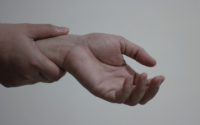Birds of a Feather

Birds of a feather flock together. And although we like to call ourselves medical “zebras”, for the purposes of this discussion I’m calling us birds to honor the age-old adage. Because we definitely flock and hang together whether we realize it or not, diagnosed or not from what I can see.
I keep finding increasing evidence that hypermobile people are attracted to each other, and I’m developing some personal albeit completely unscientific theories about this based on my widespread observations of thousands of us on and offline in support groups and forums for over three years now.
Time and time again I have seen Ehlers-Danlos Syndrome patients on and off-line “discover” this fact for themselves after falling far enough down the diagnostic rabbit-hole to recognize enough signs. I feel increasingly strongly that we are like-minded with similar energy signatures in the world and so are attracted to each other, romantically and platonically. How so?
Well, a large share of us who are articulate on Facebook and other online forums and diagnosed later in life seem to all share traits of being very high-achieving (at least once upon a time when our bodies permitted), competitive, visionary, artistic, technical, scientific people and (drum-roll) often also medical professionals and practitioners. Or we seek to be even if we’re not “there” yet.
The other common thread or theme I see are those who like order (subclinical OCD anyone?) and adherence to rules and enter the military or medical professions and thrive on following the rules to be found in those careers. Almost to a person we also like helping other people and often exhibit empathic personality traits (some extremely so). Many find they are IFNJs or similarly “rare” personality types (according to the Myers-Briggs personality survey). Yes, this can be tricky in the military and medicine. The most sensitive among us often “fall out” from the stress of feeling too much on those jobs. (PTSD anyone?) Toss in sensitive mast cells and it’s a miracle any of us get through medical or nursing school.
Many with diagnosed children in my Facebook support groups start noticing their spouses show signs as well as they become acquainted with the myriad signs and symptoms the syndrome comprises. (I like to say we put the “syn” in “syndrome”, smile.) Much like what happens with Osteogenesis Imperfecta (aka “Brittle Bone Disease”, another genetic collagen defect with some overlap with EDS), parents are often diagnosed only by proxy to a more clinically afflicted child when being evaluated by a medical geneticist. Sadly it’s often only after the child is mistakenly sent off to Child Protective Services by some of those same over-achieving nurses and doctors who fail to recognize a heritable connective tissue disorder that’s causing the bruising and fractures in the children first. (We call this medical kidnapping, and it’s sadly increasingly common.)
We are often too focused on serving and saving others and the world to notice our own issues until they become show stopping if they ever do. I feel this speaks to why EDS is rarely diagnosed once again – we are a stubborn high achieving and “other”-focused lot. I likewise think most who are diagnosed currently probably pulled the short straw, and got two bad alleles, one from each side of the family leaving us with no good collagen, and thus more “clinical” than our siblings and parents (usually).
I’m finding this likely true of my own family where I was the fist to be diagnosed at 45 in 2012 after 25 years of complaints that got me nothing but anti-depressants, ibuprofen and eye-rolls. EDS runs quite clearly in a Mendelian inheritance pattern on my late father’s side, but only later did I recognize it in my late mother’s as well. Partly because she left when I was just 10 and my parents divorced, and partly because I knew very little about her side of the family and wrote all of her complaints off to her alcoholism like everyone else. (Poor mom! My maternal grandparents died when she was quite young, so I never knew them nor much about them since she didn’t either.)
The “penny dropped” and her health history snapped into focus better when I saw someone complaining about having to get full dentures at “just 30” years old in a Facebook group. (I would complain too!) I remember my mother having full dentures as far back as I can remember. (Weak teeth are quite common with EDS.) I always thought it was because she’d had 8 children across multiple marriages (I’m her last child), but I know plenty of other mothers of large families with all of their teeth yet and plenty of energy and strength to boot.
The light bulb went off for me then and I remembered that she’d always complained of back pain, arthritis, headaches, weakness and more. She was very sensitive with extremely thin skin that tore and bruised at a glance, varicose veins and phlebitis and multiple miscarriages among many other issues. Again, her dysfunctional alcoholism (in contrast to my late father’s “functional” alcoholism in which he held a steady job) and behavioral issues (depression, anxiety, mood swings and self-medication) clouded my memory – much like happens in doctors’ offices all over the world even today.
As soon as we exhibit clinical signs of any mental health issues, everyone stops treating us for pain and physical complaints. The same happened to myself such that I will now go to my grave trying to remedy that last observation for all. (We do have mental health issues that need treating -but we also have very real and quite painful physical issues that are too often dismissed also.) But I digress.
 Everyone in the groups also seems to be on or related to someone on the Autism Spectrum, or is friends or works with some who are, myself included. Absent an autism diagnosis, we all show variations on a theme of OCD, ADD/ADHD, SPD, NPD, BPD, dyslexia, depression and anxiety among other behavioral issues (I call this the alphabet soup of sub-clinical autism). Those who are functioning in the workplace are often hiding an issue or two and “faking it till we make it” to varying degrees, some better than others. There is no shame in this mind you. Nay, we should all feel extra proud for “passing” in a very demanding and insensitive world with bodies that betray us besides. I’ve also discovered the trait of hording or collecting to be quite common among us, my family included. Alternatively the other side of the coin is quite common too – extreme tidiness, to a fault, both forms of OCD, mind. (Yes, even in the same family, trust me!)
Everyone in the groups also seems to be on or related to someone on the Autism Spectrum, or is friends or works with some who are, myself included. Absent an autism diagnosis, we all show variations on a theme of OCD, ADD/ADHD, SPD, NPD, BPD, dyslexia, depression and anxiety among other behavioral issues (I call this the alphabet soup of sub-clinical autism). Those who are functioning in the workplace are often hiding an issue or two and “faking it till we make it” to varying degrees, some better than others. There is no shame in this mind you. Nay, we should all feel extra proud for “passing” in a very demanding and insensitive world with bodies that betray us besides. I’ve also discovered the trait of hording or collecting to be quite common among us, my family included. Alternatively the other side of the coin is quite common too – extreme tidiness, to a fault, both forms of OCD, mind. (Yes, even in the same family, trust me!)
Sadly, the more clinically so who actually get diagnosed with autism are often dismissed as attention seeking or whining when they complain of their body’s aches, pains and food and chemical reactions when nothing could be further from the truth. (I urge all caregivers and providers for same to be on the watch for this – not all can speak or express themselves as clearly as myself and others, and I know at least a couple who are suffering at the hands of uninformed and misguided state services as I type. Truly heartbreaking.) I think everyone on the spectrum should be checked for the trait of hypermobility at the very least. (I’ll bet you dark chocolate most have signs.)
Photographers, programmers, engineers, musicians, painters, gardeners… you name it, we pursue it. (Geneology nerds, history buffs and linguists with sharp wits and quick puns, anyone?) And lo and behold plenty of my own friends ended up on my “suspect” (of Hypermobile EDS) list after I learned enough signs myself. Some even came to me after self-identifying on Facebook with some of my posts. And just like in my family, I see a high rate of narcissistic and codependent (think “overly nice” and/or overly helpful) behavior among us. (The two often go together – we codependents are the only folks who’ll put up with the narcissists after all.)
Sorry if this stings anyone a bit, but it’s the truth for most of us whether anyone cares to admit it or not. I’m not judging anyone, just observing shared common traits among oodles of us. (Why some of you think it’s “normal” – you’re surrounded by birds of a similar feather after all.) I keep seeing my family dynamic played out over and over among my friends and their families, even if no alcohol is involved. (Invalidating and stubborn family members or partners or doctors anyone? You’re so not alone! There’s also help for this behavioral trait – you can break the codependent cycle with work.)
On the upside I also find we all seem to channel (life) energy or Reiki as some call it quite well, attuned or not. Many of us are natural healers and pursue healing professions with or without formal Reiki training or awareness. (Everyone channels Reiki to some degree – you’d be dead without it, just some better than others.) Many identify as or with so-called Indigo Children, and a majority of the highly sensitive among us are quite empathic and often exhausted by social interaction in large or noisy groups. (I urge everyone to read Dr. Elaine Aron’s great book The Highly Sensitive Person). That said, those with the hypo-sensitive form of SPD will be sensation seeking and can appear a bit reckless.
Again, these are extremely unscientific observations (albeit of thousands), but I’ve seen more than one discussion thread in which others share some of these observations. It’s just hard to get some of us to admit or recognize our behavioral issues and traits. (I only recently recognized signs of ADD and OCD in myself since my onset storm – and how, oof dah, an interesting experience to say the least.)
And again, we have myriad talents and achievements to show for it – more than most in fact. (At least until our bodies give out, and even then.) Nay, I daresay we are all battling each other and as such are our own worst enemies inadvertently. The workaholics among us end up setting the productivity bar so high it’s unsustainable for anyone including ourselves – been there, done that! Rather like comets, we burn brightly as we blaze across the sky before we are gone. The more deliberate and steady-paced among us do the best it seems. (I’m still trying to channel my inner “tortoise” as I type.)
I’m extremely grateful for the advice an old programming buddy gave me years ago for scoping bespoke database projects: take whatever number of hours you initially think it will take to build and double it. Seriously. Then get over the sticker shock and present this to your client. Let me tell you it really worked and has served me really well since becoming disabled as I’ve been able to “scope” my “projects” (goals/tasks/ideas) more realistically than many of my afflicted friends without this practice. (Trouble finishing tasks anyone? Even without ADD/ADHD? Try scoping more realistically, then stay on task – no, not easy with ADD/ADHD/EDS/POTS/MCAD I know, trust me, but not impossible with steady effort.)

Welcome to the “family”, I hope this helps you feel less alone. (I think we’re all part of one giant clan “Dumpty” of nursery rhyme fame – I’m still looking for any King’s men myself, heh.) We are the colorful, talented, genius, and eccentric folks in the world. Our light shines brightly and should continue to. We just need to support ourselves optimally to keep on an even keel, and we’ll still (and often do) accomplish great things (all while continually beautifying the world with our caring, arts, crafts and music).
That’s how I got back out of my wheelchair 2 years ago – by applying that same high-achieving spirit and stubborn determination (and engineering gene, lucky me) to my recovery as I did to my prior work. Yes, I hope to re-apply it to paying work again some day if I can just get my mast cells to settle down a bit more! (Doggone show stoppers!) Working on it as we type.
To your health,
Jan(droid) 3.14


Hi Jan! When seeing trends online (and on Facebook specifically), there is such a huge selection bias. I know you’ve said a number of times through the post that this not the most scientific article but I think it’s still worthwhile to mention that your population of thousands is English-speaking, computer-or-cell-phone-wielding people who have time to be on such support groups. As EDS doesn’t seem to have boundaries (as far as they can tell), I wonder what EDS families in rural sub-Saharan Africa are like for instance… or even upper class EDS-ers in Bangkok for instance. It’s so easy to find patterns in things when one is surrounded by things that are similar! lol I am guilty of the same!
Absolutely May, I quite agree and readily admit my sample bias and wonder much the same. That said, I’ll hold to my unscientific theories for my anglo-centric Facebook and Inspire using audience (plus people I’ve met in real life in the US with it). But it would sure be interesting to see how it holds up across other groups. But again, I’m observing literally thousands (upwards of 10,000 seriously)… and I keep making jaws drop in real life as I point things out to friends and they connect the dots themselves – they see their lovers/wives/husbands/parents etc. as likely fellow carriers finally. (I’ve yet to find anyone who truly has a de novo mutation, not that they don’t exist either as we know.) This is why it gets missed so much IMHO -so many people have “normalized” hyperombility in their lives because they are surrounded by it – so they think “everybody’s knees/thumbs/back/fillintheblank do that” when in truth, they don’t. They are just surrounded by fellow hypermobiles as described, whether familial, or collegial. I also think we have a better survival rate to be sure than some other regions probably do for obvious reasons: better (if we choose it) nutrition and medical care and sanitation. So there are likely more of us educated internet-using folks surviving with this than would have otherwise/in years past perhaps and thus producing even more of us in this well-fed, educated western anglo-centric region/sample. Great question.
My observations are very similar to yours Jan. I too believe people with EDS are attracted to one another. I believe both my parents have the condition, I am diagnosed EDS Hypermobile type and I strongly suspect my partner (of 24 yrs) also has some form of EDS. Unfortunately most medical practitioners believe you have to be bendy to have EDS, he is not but has lots of other issues; flat feet, frequent muscle and tendon rupturing, many allergies, frequent infections as a child, gastro issues, restless legs, dry eyes (plus map dot finger dystrophy) – I could go on!… there are lots of symptoms in his other family members too. My son is diagnosed with Aspergers and it is clear both myself and his dad are Aspies too although as children of the 1970’s we are not formally diagnosed. Both my children score very highly on the Beighton scale. I have been diagnosed with OCD, depression, anxiety, IBS and GERD but the EDS and Aspergers were unsurprisingly missed! I recognised symptoms in myself after reading Sam Crafts Everyday Aspergers blog and then went to the London Hypermobility Clinic for diagnosis. Reading your signs of EDS was like reading my life history! Agree about the high IQ, everyone I know with the condition is highly intelligent. As a family we are also creative and artistic. I shall be following your blog and would be very pleased to assist with any research as EDS is definitely my special interest right now. It affects so many loved ones naturally I want to find out all I can.
Glad my writing and descriptions “spoke” to you Melissa, and you could relate. I think we’re really all part of one giant “Clan Dumpty”, as in of “Humpty Dumpty” fame 😉 – and true to form, no one can put us back together again – or not for long or well. That said, in fairness to the rest of the autism spectrum, not everyone is as literate and verbal as we may be, on or off line, so it’s easy to generalize and assume high IQ – again, there’s that attraction thing – we’re probably naturally attracted to each other as fellow riddle-loving folks. But I’d be willing to bet some chocolate that my theory of attraction holds even in those with learning disabilities or differences. In any case, it sure explains the pairings I see in those of us who do express ourselves well online in English. Welcome to the “family”. But I do hope to give more voice to those who aren’t as verbal too – I can’t imagine how hard it must be to live with this, yet be unable to describe your pain fully or well. It’s hard enough for those of us that are eloquent and can, heaven help anyone else.